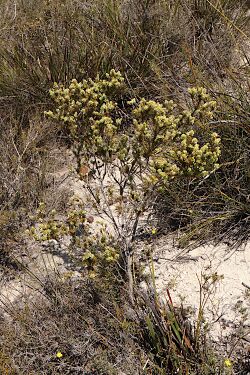Biology:Styphelia flavescens
| Styphelia flavescens | |
|---|---|

| |
| Scientific classification | |
| Kingdom: | Plantae |
| Clade: | Tracheophytes |
| Clade: | Angiosperms |
| Clade: | Eudicots |
| Clade: | Asterids |
| Order: | Ericales |
| Family: | Ericaceae |
| Genus: | Styphelia |
| Species: | S. flavescens
|
| Binomial name | |
| Styphelia flavescens (Sond.) F.Muell.[1]
| |

| |
| Occurrence data from AVH | |
| Synonyms[1] | |
|
Leucopogon flavescens Sond. | |
Styphelia flavescens is a species of flowering plant in the heath family Ericaceae and is endemic to the south-west of Western Australia. It is a shrub with oblong leaves and white, tube-shaped flowers that are densely bearded on the inside.
Description
Styphelia flavescens is an erect shrub that typically grows up to a height of 0.6–1.2 m (2 ft 0 in–3 ft 11 in) and has minutely, softly-hairy branches. Its leaves are moderately crowded, oblong, 6–12 mm (0.24–0.47 in) long on a very short petiole. The flowers are arranged singly in leaf axils with bracteoles but no bracts at the base. The sepals are less than 2 mm (0.079 in) long, the petals white and densely hairy on the inside.[2]
Taxonomy and naming
This species was first formally described in 1845 by Otto Wilhelm Sonder in Johann Georg Christian Lehmann's Plantae Preissianae.[3][4] In 1867, Ferdinand von Mueller transferred the species to Styphelia as S. flavescens in Fragmenta phytographiae Australiae.[1][5] The specific epithet (flavescens) means "yellowish", referring to the leaves when dried.[6]
Distribution
This styphelia occurs in the Avon Wheatbelt, Esperance Plains and Jarrah Forest bioregions in the south-west of Western Australia.[7]
Conservation status
Styphelia flavescens is listed as "not threatened" by the Government of Western Australia Department of Biodiversity, Conservation and Attractions.[7]
References
- ↑ 1.0 1.1 1.2 "Styphelia flavescens". Plants of the World Online. https://powo.science.kew.org/taxon/urn:lsid:ipni.org:names:325769-1#synonyms.
- ↑ Bentham, George (1868). Flora Australiensis. 4. London: Lovell Reeve & Co.. p. 213. https://www.biodiversitylibrary.org/page/11266434#page/222/mode/1up. Retrieved 24 October 2022.
- ↑ "Leucopogon flavescens". APNI. https://id.biodiversity.org.au/instance/apni/525768. Retrieved 24 October 2022.
- ↑ Sonder, Otto W. (1845). Plantae Preissianae. 1. Hamburg. p. 322. https://www.biodiversitylibrary.org/item/199352#page/682/mode/1up. Retrieved 24 October 2022.
- ↑ von Mueller, Ferdinand (1867). Fragmenta phytographiae Australiae. Melbourne: Victorian Government Printer. p. 33. https://www.biodiversitylibrary.org/item/7223#page/34/mode/1up. Retrieved 8 January 2024.
- ↑ Sharr, Francis Aubi; George, Alex (2019). Western Australian Plant Names and Their Meanings (3rd ed.). Kardinya, WA: Four Gables Press. p. 200. ISBN 9780958034180.
- ↑ 7.0 7.1 "Styphelia flavescens". FloraBase. Western Australian Government Department of Parks and Wildlife. https://florabase.dpaw.wa.gov.au/browse/profile/49804.
Wikidata ☰ {{{from}}} entry
 |


